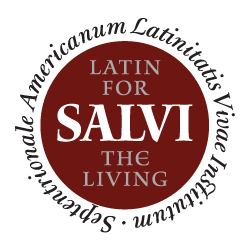
by John Byron Kuhner, ©2009
Download this document
You may not remember the names of all the cups, bowls, plates, etc. Fine. Don't get caught on it in conversation. Use the general terms:
The above words, coupled with hic-haec-hoc (this) and a gesture, will cover an astounding number of possibilities.
You can also do this with verbs. Latin has a handful of verbs which can be made to do stupendous amounts of work in a conversation.
Video: This can serve as "I see," "I understand," or in the past can mean things like "I met" (always a tricky thing to express in Latin, usually done by the Romans with obviam or obvius, maybe incido, occurro, convenio, obvenio).
Ago: Remember learning that long list of its meanings in Latin I? Now is the time to use it. Yes, it can mean anything when it has an accusative, and without an accusative it can mean "discuss."
Habeo: Means "have in hand" but also "own," and gets really useful with infinitives: "Quid habes dicere?" "Nihil habeo facere." It almost serves as a future and an expression of necessity. With "non" it can serve in place of verbs like careo and egeo which you know are going to make you trot out an ablative.
Fero: Yet another great Latin verb. "Carry," "bring," but also "report."
Facio: Like ago, this verb will satisfy almost every accusative you need a verb for.
Dico: Pretty indispensable, though as mentioned ago and fero will serve in its place when needed.
Sum: Necessary.
Possum and volo and placet mihi. Very useful. These plus infinitives will build you hundreds of sentences in no time.
The above ten verbs will not only provide you with tons of things you can say, but your first questions to other people will probably use one of these verbs. Mastering their forms and tenses and using them often is a great way to build confidence and fluency in Latin.
It's useful to use the "Erasmus approach" with Latin conversation. Erasmus was a collector and master of innumerable adages[1], which he could deploy at will in conversation. It's useful to read through some Latin proverbs (there are many collections available, in book form or online) or florilegia from the authors. Try to commit some to memory. They serve as ready-made sentences for you to insert when appropriate (which they often are).
Not only are they useful in themselves, but if your interlocutors recognize them they usually get some pleasure as well. And if you vary them slightly to fit the context better, the pleasure will be doubled.
They say the great Ted Williams would never swing and miss during batting practice. He wouldn't attempt to hit home runs: he would just make sure he made contact with every single ball he saw. By focusing on a limited objective and not trying to do too much, he got continually better. Say what you can, always trying to say it correctly and clearly, and listen for the reply. Learn as you go - disces eundo.
Footnotes
SALVI
3445 Hicks Road
Sebastopol, CA 95472